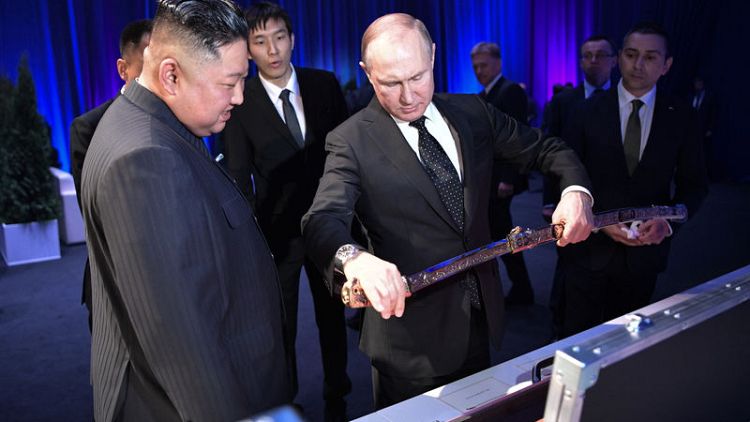By Vladimir Soldatkin and Maria Vasilyeva
VLADIVOSTOK, Russia (Reuters) - Russian President Vladimir Putin said after holding talks with North Korean leader Kim Jong Un on Thursday that he thought U.S. security guarantees would probably not be enough to persuade Pyongyang to shut its nuclear programme.
Putin and Kim held a day of talks on an island off the Russian Pacific city of Vladivostok two months after Kim's summit with U.S. President Donald Trump ended in disagreement, cooling hopes of a breakthrough in the decades-old nuclear row.
Putin, keen to use his summit with Kim to burnish Russia's diplomatic credentials as a global player, said he believed any U.S. guarantees might need to be supported by the other nations involved in previous six-way talks on the nuclear issue.
That would mean including Russia, China, Japan and South Korea as well as the United States and North Korea, in a long-standing format that had been sidelined by unilateral U.S. efforts to broker a deal.
"They (the North Koreans) only need guarantees about their security. That's it. All of us together need to think about this," Putin told reporters after his first ever face-to-face talks with Kim.
"...I'm deeply convinced that if we get to a situation when some kind of security guarantees are needed from one party, in this case for North Korea, that it won't be possible to get by without international guarantees. It's unlikely that any agreements between two countries will be enough."
Such guarantees would have to be international, legally-binding, and vouch for North Korea's sovereignty, said Putin.
The first session between Putin and Kim, comprising one-on-one talks with just a few aides present, lasted twice as long as the 50 minutes allocated in the schedule.
Putin described Kim as "quite open" and as "thoughtful" and "interesting".
Promising to brief the Chinese and U.S. leadership about his talks, Putin said he thought a deal on Pyongyang's nuclear programme was possible and that the way to get there was to move forward step-by-step in order to build trust.
Kim, who arrived in Vladivostok on Wednesday on board his armoured train, said the situation on the Korean peninsula "is an issue that the world is very interested in".
He did not speak to the media afterwards, but shook hands with Putin before being driven away in his limousine.
The two leaders had earlier attended a gala dinner where they toasted each other and watched traditional musical numbers and dancing performed by Russian artists.
The numbers included the Russian classic song "Black Eyes" and a Korean song called "the Great Commander," Russian state media reported.
SANCTIONS
With North Korea-U.S. talks stalled, the summit in Vladivostok has provided Pyongyang with an opportunity to seek Russian support and possible relief from the sanctions hurting its economy.
For the Kremlin, the summit was a chance to show it remains an important actor on the global stage despite efforts by the United States and other Western states to isolate it.
But with Moscow committed to upholding international sanctions until North Korea dismantles its nuclear programme, Russia's room for manoeuvre, beyond putting on a show of camaraderie, was limited.
Putin has a track record of making world leaders wait for him, but on Thursday the Russian leader arrived at the venue around half an hour before Kim showed up, according to a Reuters reporter at the scene.
Putin's last summit with a North Korean leader was in 2002 when his counterpart was Kim Jong Il, Kim Jong Un's father and predecessor. Kim Jong Il also met in 2011 with Dmitry Medvedev, then Russia's president and now its prime minister.
Thursday's summit took place on the campus of the Far Eastern Federal University, a complex that back in 2012 played host to an Asia-Pacific Economic Cooperation summit.
(Additional reporting by Hyonhee Shin and Joyce Lee in SEOUL and Maria Kiselyova, Darya Korsunskaya and Maxim Rodionov in MOSCOW; Writing by Christian Lowe/Andrew Osborn; Editing by Gareth Jones)
